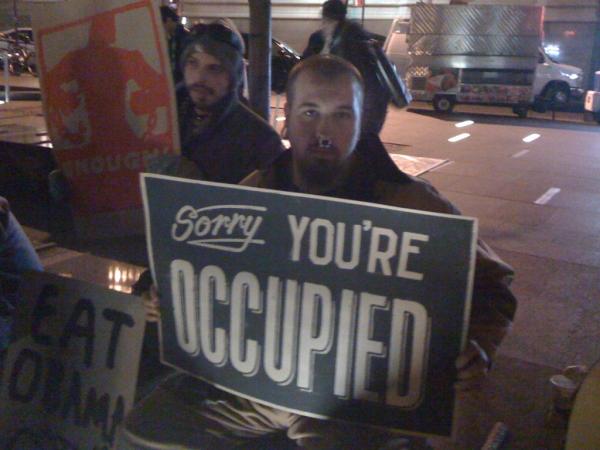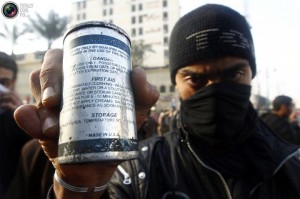Listening to Egyptian activists yesterday at 16 Beaver, I was reminded how intense and costly their effort had been compared to ours. Yet the paradox of the global spectacle is that the concentration of attention on “New York” means that what happens here has dramatically asymmetric results. How can we leverage it, using citizen media to counter both spectacle and violence?
1. Egypt
The session began with the screening of a video by Mosireen, the remarkable Egyptian video collective that has been practicing horizontal “citizen media,” to use their term, since the beginning of the revolution.
Warning: this is a very graphic video, showing military violence against unarmed citizens.
The Army can be seen here operating with far greater tactical precision and willingness to use deadly force than the police and other security forces could muster to defend Mubarak. By walling off Tahrir, it has become a place of entrapment as well as liberation. Torture is again routine and cameras are targeted during demonstrations. The result of this violence instigated by the Supreme Council of the Armed Forces (SCAF) has been to reintroduce layers of fear that were set aside during the struggle against Mubarak.
The Egyptian activists emphasized that the Army is also an economic force, controlling about 40% of the Egyptian economy from pasta to real estate. They even suggested: “None of us understood what the regime is”–note the present tense. That is to say, the embedded presence of the Army at all levels of society since 1954 has rendered the militarization of the social “normal.” It was pointed out that the directors of the opera, zoo and national cinema in Cairo are all retired generals, who occupy some 70-80% of all government positions.
They suggested that the recent violence, especially during the November re-occupation of Tahrir, had woken people from the “dream” that “the people and the Army are one hand.” The present situation was described evocatively as “chaos,” with no one knowing who controls what. The three speakers presented very different assessments of the current situation. In response to questions from New York (via Skype), it was fascinating to see that even on the ground, people did not fully understand the flow of the popular movements. Why some calls to action generated response from thousands and others passed by remains unclear, perhaps inevitably–it is the other form of “chaos,” not a breakdown of order, but the formation of a new order from causes so disparate and multiple that they cannot be defined, even in retrospect.
2. Occupy
The obvious question was: what can we do? One direct answer was campaign against the American- and UK-made tear gas that is being used in Cairo (and against Occupy). It was heartening to hear that an OWS working group has just been set up on this area. Who has shares in these companies? From past experience, it’s very likely that TIAA-CREF, CALPERS and other pension firms used by academics will do and pressure can be exerted on them.
Think of the asymmetry here: two pepper-spray incidents, one in New York and one in Davis by the cops Bologna and Pike respectively galvanized Occupy into its present position. In Egypt, such events would barely be noticed other than by those unfortunate enough to suffer them. On the other hand, there are more police in New York City than there are in the whole of Greece, so who’s living in the police state?
In Davis, the students turned around the police violence by forming a new relation of the visible and the sayable. They formed a wall of cameras, phones and iPads for the most part, and confronted the police with them. They then raised a chant of “Shame on you.” The combination of being narrowcast and named drove the police back into the welcoming embrace of Chancellor Katehi, a Greek university official who had been the first to accept police on a Greek university campus since the military dictatorship.These interfaces are in no way accidental.
The task ahead is to mobilize and activate–make “live”–these asymmetric connections. Ironically, the very networks of travel, media, communications and education that were intended to prepare subjects for labor in the global economy have made this possible, especially now that finance capital has no use for them. It is, as we used to say, no coincidence that the US Congress is rushing to criminalize such practices on the Internet. It won’t work.



La gramática es siempre cinematográfica.
Absolutely:)